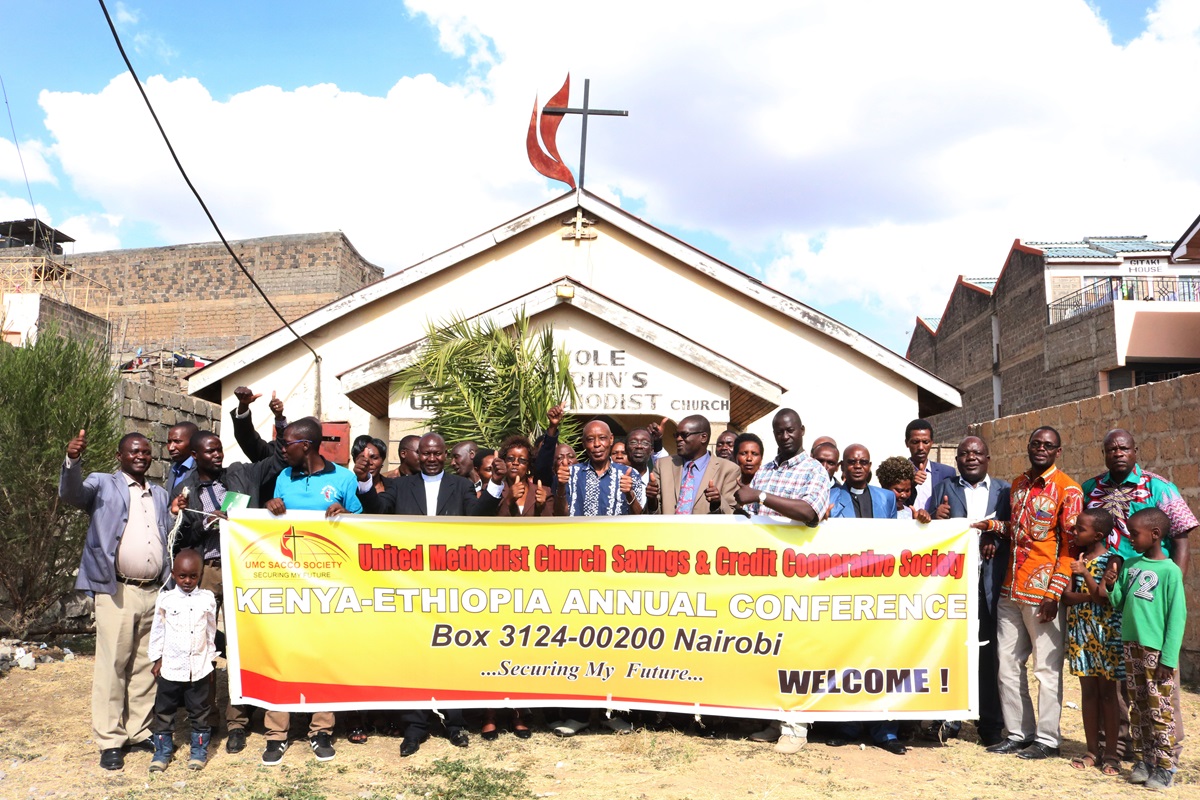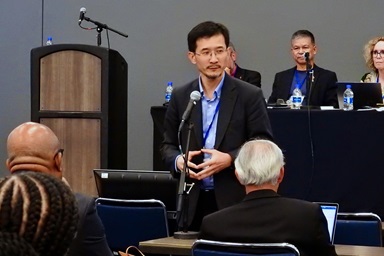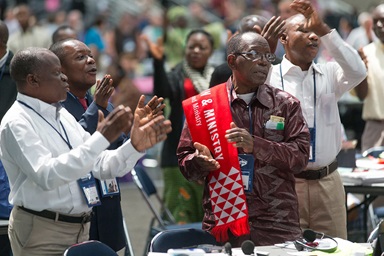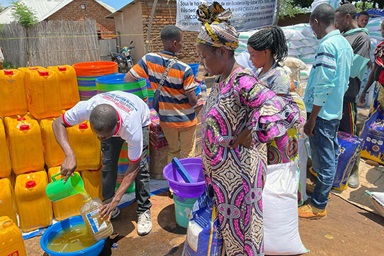The United Methodist Church in Kenya is empowering its members and the community at large with the opening of the new United Methodist Church Savings and Credit Co-Operative Society. It is the first church-based financial institution in the East Africa Episcopal Area.
Church and community members gathered at Kayole St. John’s United Methodist Church to celebrate the milestone, with Bishop Daniel Wandabula presiding.
The mission of the United Methodist Church Savings and Credit Co-Operative Society is to promote a savings culture and provide affordable credit and sustainable financial solutions to members and stakeholders.
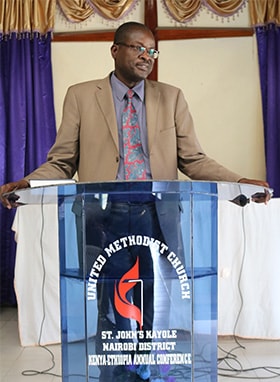
East Africa Bishop Daniel Wandabula delivers a sermon at Kayole St. John's United Methodist Church in Nairobi, Kenya. The service marked the opening of the United Methodist Church Savings and Credit Co-Operative Society. Photo by Gad Maiga, UM News.
“The formation of the church credit union was driven by the need to develop an association where United Methodists in East Africa could work together to promote their economic interests through a pooling of resources,” Wandabula said.
He said it also was a response to February’s special General Conference. During the legislative session, a majority of delegates voted for the Traditional Plan, which affirmed the church’s current bans on “self-avowed practicing” gay clergy and strengthened penalties to enforce the prohibition. Some United Methodists in the U.S. and Europe have rejected the provisions and said they won’t abide by the new law.
“The goal is to become more self-sustaining, as most annual conferences in Africa heavily depend on the global church for funding major programs and ministries, such as hospitals, universities and community development projects,” he said.
The credit union is the brainchild of United Methodist Men in the Nairobi District. An autonomous enterprise, it is jointly owned and democratically controlled by members.
Ben Khalonyere, president of the men’s group, said that the unveiling of the co-op has been well received by church members.
“It will mobilize funds and offer timely, quality and competitive financial services to our members in order to uplift their social economic status,” he said.
Wandabula thanked the men’s group for taking the lead in coming up with a way to help solve the economic challenges facing the church in East Africa.
“The United Methodist Church Savings and Credit Cooperative Society will help the church and society to live a meaningful, decent life that will make members of the church appreciate who they are in the society, as well as alleviate the belief that saving is predominantly the prerogative of the rich,” he said.
“We are aware the majority of our church members live below a dollar in their daily earnings and some do not earn anything for a whole week. … As a church, we cannot live armchair and wait for manna to fall from heaven. … We need to employ ways that inspire our people, such as giving them startup capital and little contributions to boost their livelihood,” he said.
Deborah Rurayi, a member of Kayole St. John’s United Methodist Church, is a tailor who sells vitenge (East African cotton fabric printed in various colors and designs). She left another credit union to join this one and said she is happy with her decision.
“When I came to know about the (savings co-op), I never thought twice on whether to join it. I believe the United Methodist Church Savings and Credit Co-Operative Society will give me a loan to expand my small business so I can pay school fees for my six children,” she said.
Patience Mukambanguza plans to apply for her first loan in six months to help boost her small vegetable business. A United Methodist, she said she is excited about the opportunities the credit union provides.
“It gives us women the opportunity to borrow loans when banks require a long list of conditions to be met before a loan is granted. I am learning gems that are guiding me through my financial growth,” she said.
United Methodist teacher Jean Pierre also joined the Church Savings and Credit Co-Operative Society and he is pleased with the results.
“Six months ago, I was undecided on savings. The credit union representatives encouraged us to put aside a part of our salaries. We filled the membership forms and agreed among ourselves as teachers that we were to give the minimum contribution of 500 Kenyan Shillings ($5 U.S.) a month. We are nurturing our savings nest. I will encourage more teachers to join,” he said.
During the celebration at Kayole St. John’s, Javan Mudibo, credit union president, assured the congregation that the leadership, management and members shall be a family unit.
“We shall always aim at working together as a team. All members will be treated equally without any favoritism and discrimination.
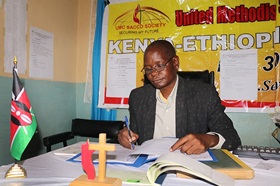
Felix Wandera handles paperwork at the United Methodist Church Savings and Credit Co-Operative Society in Nairobi, Kenya. Wandera is assistant president of the credit union, the first church-based financial institution in the East Africa Episcopal Area. Photo by Gad Maiga, UM News.
“The fact that its membership is expected to increase steadily every year makes it suitable to serve as a means to stimulate wealth creation and reduce the poverty of its members,” he said.
The Rev. Patrick Wandera, resident pastor at Kayole St. John’s United Methodist Church, encouraged church members to join the co-op so that they can move forward together.
“Remember, if you eat and your neighbor is hungry, then you will become enemies. … Here is a way to enable each person to grow little by little with a focus on raising one’s life,” he said.
Peter Kirara, an officer from the Kenyan government co-operative department, presented the church with a certificate of registration. He said the credit union would help clergy and believers advance personally and as a religious group.
“We want churches to join in the mobilization of local resources so that they can have access to credit and help in the country's development. Through such an initiative, we can all invest in agriculture and other sectors,” he said.
A recent study by the society revealed that a significant percentage of United Methodists in Kenya do not have bank accounts (14.2 percent are served by banks, 13.1 by credit unions and 1.7 by microfinance institutions).
“This is a big opportunity for the United Methodist Church Savings and Credit Co-Operative Society,” said the Rev. Wilton Odongo, conference secretary to the East Africa Episcopal Area and Nairobi District superintendent. “There is an untapped market.”
He said that credit union does not raise equity from outside sources, so it’s important to register with the United Methodist institution. Its strength lies in numbers, he said, and participation will help build up the Kenya-Ethiopia Conference.
“It’s our prayer and appeal to all friends, Christians of good will, foundations in the Wesleyan movements, to boost this newly born baby in her humble beginnings to stand,” he said.
Maiga is a communicator for the Kenya-Ethiopia Conference.
News media contact: Vicki Brown at (615) 742-5470 or newsdesk@umnews.org. To read more United Methodist news, subscribe to the free Daily or Weekly DigestsLike what you're reading? Support the ministry of UM News! Your support ensures the latest denominational news, dynamic stories and informative articles will continue to connect our global community. Make a tax-deductible donation at ResourceUMC.org/GiveUMCom.

